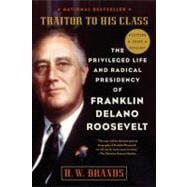
Note: Supplemental materials are not guaranteed with Rental or Used book purchases.
Purchase Benefits
What is included with this book?
H. W. BRANDS is the Dickson Allen Anderson Professor of History at the University of Texas at Austin. The author of Andrew Jackson, Lone Star Nation, and The Age of Gold, he was a finalist for the Pulitzer Prize for biography for The First American: The Life and Times of Benjamin Franklin. He lives in Austin, Texas.
The New copy of this book will include any supplemental materials advertised. Please check the title of the book to determine if it should include any access cards, study guides, lab manuals, CDs, etc.
The Used, Rental and eBook copies of this book are not guaranteed to include any supplemental materials. Typically, only the book itself is included. This is true even if the title states it includes any access cards, study guides, lab manuals, CDs, etc.
Excerpted from Traitor to His Class: The Privileged Life and Radical Presidency of Franklin Delano Roosevelt by H. W. Brands
All rights reserved by the original copyright owners. Excerpts are provided for display purposes only and may not be reproduced, reprinted or distributed without the written permission of the publisher.